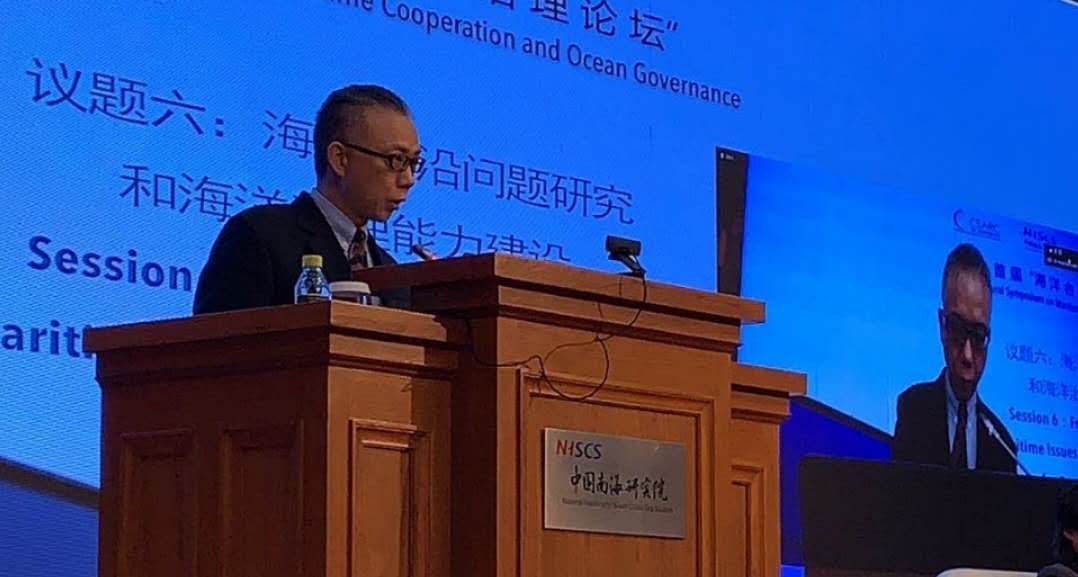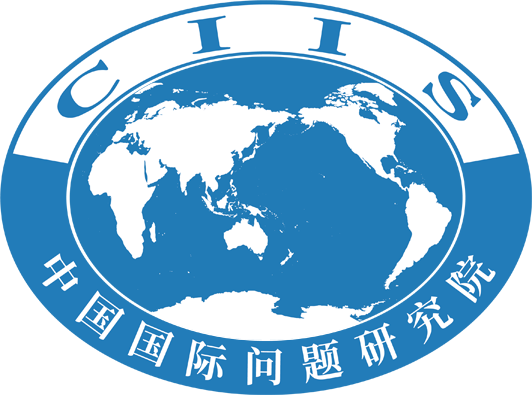On November 5th and 6th, President Xu Bu of the China Institute of International Studies (CIIS) was invited to attend the Inaugural Symposium on Maritime Cooperation and Ocean Governance. The forum was hosted by the National Institute for South China Sea Studies, and President Xu delivered a keynote speech on "Joining Hands to Build a Community of Ocean Destiny". More than 200 experts and scholars from the U.S., U.K., and countries in Southeast Asia attended the forum. In his speech, President Xu highlighted China's contribution to maritime cooperation and governance, and made four suggestions to address the problems of ocean governance.

The full text of President Xu's speech follows.
Building a Community of Ocean Destiny Together
---- Remarks at the Inaugural Symposium on
Maritime Cooperation and Ocean Governance
Xu Bu, president of the China Institute of International Studies
First of all, I would like to thank the National Institute for South China Sea Studies for inviting me to participate in this very important conference. As a former Chinese Ambassador to ASEAN, I am especially pleased to meet my old friends from ASEAN countries.
With the expansion of industrialization and globalization around the world, problems such as marine environmental pollution and ecological damage, the increase in various illegal activities at sea, sea-level rise caused by global climate change, and ocean acidification have become increasingly serious. For a long time, the international community has made unremitting efforts to address these challenges, but the situation of global ocean governance remains grave. The fragmentation of ocean governance mechanisms, the tendency of some countries to “hitchhike”, the declining willingness of a few major countries to participate in ocean governance, and the lack of capacity of the vast number of developing countries to participate in ocean governance are all realistic challenges facing global ocean governance.
China is a major maritime power and the largest developing country, a fact that indicates both the responsibility of China’s participation in global ocean governance and its lack of capacity. In recent years, China has been vigorously promoting capacity building for ocean governance on its own merits and with a global outlook. As a responsible major country, China has been contributing its strength and wisdom to promote global ocean governance. This is manifested in the following areas.
First, China actively maintains the safety of international sea lanes. Since 2008, China has sent 36 batches of escort convoys to the Gulf of Aden and Somali waters, escorting more than 6,800 ships in 1,300 batches, including 3,559 foreign merchant ships, successfully rescuing five ships attacked by pirates on board, and rescuing 45 ships pursued by pirates on 34 occasions. Since 2015, China has conducted more than 600 search and rescue operations in the surrounding waters, dispatched more than 600 ships and 300 helicopter sorties, and rescued more than 1,300 people in distress. China actively supports the capacity building and development of the Information Sharing Center of the Regional Cooperation Agreement on Combating Piracy and Armed Robbery against Ships in Asia (ReCAAP), and has assigned Chinese Coast Guard officers to the Center.
Second, China is strengthening maritime cooperation with relevant countries through the 21st Century Maritime Silk Road Initiative. China is actively cooperating with countries along the route in marine development, marine science and technology, marine disaster prevention, and other fields. China advocates the establishment of early warning systems for marine disasters in the South China Sea, the Arabian Sea and the Gulf of Aden, as well as joint research and development of marine disaster warning products to provide services for maritime transportation, maritime escort and disaster prevention. China supports the operationalization of the South China Sea Tsunami Warning Center to provide tsunami warning services to neighboring countries. China advocates deepening marine scientific research and technical cooperation, strengthening cooperation in the marine survey, observation equipment, renewable energy, seawater desalination, marine biopharmaceuticals, marine food technology, marine drones and unmanned ships, and strengthening the docking of marine technology standard systems and technology transfer cooperation. China has established marine climate research centers or joint laboratories of marine ecosystems with Malaysia, Indonesia, Thailand, Pakistan and other countries to jointly improve research capabilities in marine science and technology, marine climate and marine ecology.
Third, China actively participates in building a cooperative platform for ocean governance. Under APEC, the East Asia Cooperation Leaders' Meeting Series, and the China-ASEAN Cooperation Framework, China has established cooperation mechanisms such as the Blue Economy Forum, the Marine Environmental Protection Seminar, the Maritime Consultation, the Maritime Cooperation Forum, the China-ASEAN Maritime Cooperation Center, and the East Asia Maritime Cooperation Platform. China has also deepened practical maritime cooperation with ASEAN countries under the framework of the full and effective implementation of the Declaration on the Conduct of Parties in the South China Sea, actively promoted the consultation on the Code of Conduct in the South China Sea, and created regional rules recognized by China and ASEAN countries in an effort to achieve common governance.
Fourth, China actively provides financial support for regional maritime cooperation. China has established the China-ASEAN Maritime Cooperation Fund and the China-Indonesia Maritime Cooperation Fund, and has implemented the Framework Plan for International Cooperation in the South China Sea and Surrounding Seas. The AIIB and the Silk Road Fund also provide financial support for major maritime cooperation projects.
Fifth, China has proposed and promoted the establishment of the Blue Partnership. In addition to signing the Declaration on the Establishment of Blue Partnership in the Marine Sector for Ocean Governance, Sustainable Fisheries Development and Ocean Economic Prosperity with the European Union, China has also issued the Pingtan Declaration jointly with 12 island countries from four continents in areas including, but not limited to, the development of the blue economy, protection of the ecological environment, combating climate change, marine disaster prevention and mitigation, combating IUU fishing, management and reduction of marine litter especially microplastics, etc. China has signed bilateral Blue Partnership maritime cooperation plans or memoranda of understanding with Portugal, Seychelles and other countries to strengthen cooperation in marine scientific research, marine economic development, marine ecological protection and restoration, and other fields.
Given the current problems with ocean governance, I make the following four recommendations.
First, firmly establish the awareness of the community of ocean destiny. As the ocean is the common home of mankind, it is everyone's responsibility to care for the ocean and protect it. President Xi Jinping pointed out that "the blue planet we humans live on is not divided into islands by the ocean, but connected by the ocean into a community of destiny, where people of all countries share the same security and danger." From a long-term perspective, global ocean governance is not an issue for individual countries, but an important issue for the international community. If it is not properly addressed, it will affect the future sustainable development of human society and the oceans, and all countries will be forced to swallow the bad consequences. Therefore, the promotion of global ocean governance requires the universal participation of all countries, and the coastal states are duty-bound. Regardless of their national strengths, they should, within the limits of their abilities, earnestly fulfill their main responsibilities, formulate strict laws and regulations, improve the law enforcement and regulatory system, and make due efforts to prevent pollutant discharge, overfishing, and combat maritime organized crime.
Second, developed countries should provide more help to developing countries. The ocean is a fluid whole, accounting for 71% of the earth's surface area. It is generally agreed in academic circles that collaborative governance is the best way to promote ocean governance, and the promotion of collaborative governance requires the joint participation of developed and developing countries, as well as coastal and landlocked countries. There are a large number of underdeveloped coastal countries in the world. Some underdeveloped countries are limited in ocean governance issues due to capacity constraints. This requires more help from developed countries in terms of technology, funding, equipment, and personnel training to effectively address the technical and financial shortages of developing countries. Helping developing countries with their ocean governance capacity is also beneficial to their interests.
Third, to strengthen maritime security dialogue and cooperation. Peace and tranquility in the oceans affect the security and interests of all countries, and need to be jointly safeguarded and treasured by all countries. China is committed to promoting, on the basis of full consultation and consensus, an inclusive and open security architecture based on the participation of all countries on an equal footing, so as to contribute to regional security and stability. To this end, all countries should continuously improve the maritime crisis communication mechanism, strengthen regional security cooperation, promote the proper resolution of maritime differences, join hands to deal with common threats and challenges at sea, and strive to maintain maritime peace and tranquility.
The fourth is to discard unilateralism in ocean governance. With the rise of populism, global ocean governance also faces the challenge of "reverse globalization," and the novel coronavirus pneumonia epidemic may further exacerbate the tendency of unilateralism in some countries. Existing relevant capacity-building assistance mechanisms and cooperation platforms may be abandoned or stalled as some traditional ocean powers abandon multilateralism. Therefore, it is important to build consensus on global ocean governance, continue to promote capacity building and maintain the normal operation of existing cooperation mechanisms, and accelerate "global action" and "local participation" in ocean governance.
Thank you all!



